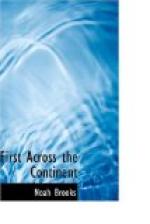Such a storm is known in the West as a cloud-burst. Overland emigrants in the early rush to California often suffered loss from these sudden deluges. A party of men, with wagons and animals, have been known to be swept away and lost in a flood bursting in a narrow canyon in the mountains.
“Captain Clark now relinquished his intention of going up the river, and returned to the camp at Willow Run. Here he found that the party sent this morning for the baggage had all returned to camp in great confusion, leaving their loads in the plain. On account of the heat, they generally go nearly naked, and with no covering on their heads. The hail was so large, and driven so furiously against them by the high wind, that it knocked several of them down: one of them, particularly, was thrown on the ground three times, and most of them were bleeding freely, and complained of being much bruised. Willow Run had risen six feet since the rain; and, as the plains were so wet that they could not proceed, they passed the night at their camp.
“At the White Bear camp, also,” (says Lewis), “we had not been insensible to the hailstorm, though less exposed. In the morning there had been a heavy shower of rain, after which it became fair. After assigning to the men their respective employments, Captain Lewis took one of them, and went to see the large fountain near the falls. . . . It is, perhaps, the largest in America, and is situated in a pleasant level plain, about twenty-five yards from the river, into which it falls over some steep, irregular rocks, with a sudden ascent of about six feet in one part of its course. The water boils up from among the rocks, and with such force near the centre that the surface seems higher there than the earth on the sides of the fountain, which is a handsome turf of fine green grass. The water is extremely pure, cold, and pleasant to the taste, not being impregnated with lime or any foreign substance. It is perfectly transparent, and continues its bluish cast for half a mile down the Missouri, notwithstanding the rapidity of the river. After examining it for some time, Captain Lewis returned to the camp. . . .”
“Two men were sent (June 30) to the falls to look for the articles lost yesterday; but they found nothing but the compass, covered with mud and sand, at the mouth of the ravine. The place at which Captain Clark had been caught by the storm was filled with large rocks. The men complain much of the bruises received yesterday from the hail. A more than usual number of buffalo appeared about the camp to-day, and furnished plenty of meat. Captain Clark thought that at one view he must have seen at least ten thousand.”
Of the party at the upper camp, opposite White Bear Islands, the journal makes this observation:—




